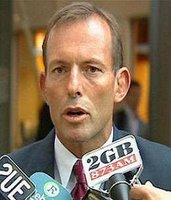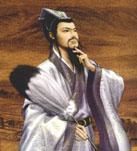

Tony Abbott's gaffe about the ALP's affirmative action policy (branch-stacking) has taken a little wind out of his stand on multiculturalism. Still, one shouldn't confuse a person's integrity with the validity of their argument:
Whether shari'a is compatible with our constitutional system can be debated, but the principle is sound. As a tactical approach towards Islamic extremism, I'm prepared to back communal dialogue over assimilate-or-be-ostracised; could it be that we hear so little from moderate Muslims because we leave them no space to talk in? But more importantly, Tony's got the basics right.
"I do not find sharia law, as I understand it, to be particularly appealing but I think that people are perfectly entitled to make a case for anything that is not inconsistent with the law of this land," [Abbott] said.
Whether shari'a is compatible with our constitutional system can be debated, but the principle is sound. As a tactical approach towards Islamic extremism, I'm prepared to back communal dialogue over assimilate-or-be-ostracised; could it be that we hear so little from moderate Muslims because we leave them no space to talk in? But more importantly, Tony's got the basics right.
An Australian citizen has one obligation: to obey the laws of this country. He or she doesn't have to subscribe to an amorphous set of 'Australian values' laid down by politicians or a particular understanding of Australian history. To quote He-of-the-Magnificent-Ears, citizens should not be subjected to a "test of Australian-ness". If they want to wear the burqa or believe that European settlers committed genocide against aborigines, that's their business and not society's concern.
That's why the 'un-Australian' rhetoric that's slipped into political jargon is so pernicious. The great strength of liberal democracies is their capacity to accommodcate diverse groups under the rule of law, without imposing an elite or majoritarian idea of truth. That's what multiculturalism means - accepting any individual who's prepared to be a functioning member of the body politic, without requiring them to otherwise conform. That's why Abbott is right and Costello wrong. Multiculturalism is not 'misguided', it's fundamentally in tune with the classical liberal principles that this country was built on.
There's much talk right now about the formula that's made John Howard the most popular Australian PM of the modern era (which is to say most popular, since most people can't name any before Menzies). If you had to boil it down to a phrase, it'd be 'identity politics'. Howard has weathered a series of crises plus several rounds of unpopular legislation, and come out ever stronger, because he's managed to identify himself and his party with the worldview of a majority of the population. Lately this has meant constantly referencing a core of innate 'Australian values' around which membership of Australian society must be based.
There's much talk right now about the formula that's made John Howard the most popular Australian PM of the modern era (which is to say most popular, since most people can't name any before Menzies). If you had to boil it down to a phrase, it'd be 'identity politics'. Howard has weathered a series of crises plus several rounds of unpopular legislation, and come out ever stronger, because he's managed to identify himself and his party with the worldview of a majority of the population. Lately this has meant constantly referencing a core of innate 'Australian values' around which membership of Australian society must be based.
In other words, Howard has established a cultural creed - that of 'middle Australia,' 'battling Australia ' and the other constituencies on which the Liberal ascendancy rests - as the basis of national politics. After ten years, this approach is running up against the acultural lines on which our constitutional system is organised. It began with post-Keating assertions of 'national character', gained momentum with the asylum seeker battles at the turn of the century and has come to full bloom with society's handling of the 'Muslim problem' post-9/11.
Societies throughout history have achieved cohesion by imposing a given moral and cultural order. But liberal democracies don't, and that's what sets them apart. They endure, and prosper, because people are left alone within the framework set by law and elected government. Just remember that the next tine you hear a call for indoctrination with 'Australian values' or an end to 'mushy multiculturalism'.

2 comments:
Thank you for a very interesting read. However, I have a fundamental issue with your belief that liberal democracies have 'prospered' without imposing a moral and cultural order. As an Englishman I can assure you that until 1914 this country (a reasonably old liberal democracy) had a very clear moral and cultural code. When we were threatened by a meaningful challenge to that code, we went to war. For nearly a thousand years we managed to 'prosper' by very, very gradually evolving those codes. Everyone on this small island knew what they were.
Now, under the banner of multiculturalism, we are witnessing a frightening disintegration of national identity.
As an outsider, I am very clear on what 'Australian values' are. I believe that in denying their existence you will create the very 'mush' you seem to want to avoid.
I agree that the English constitutional system developed across a long span of time (one more argument against fast-tracking democracy in other countries, especially where military force is involved).
However I wouldn't characterise England as a 'liberal' democracy before the 19thC. A society in which only land-owning male Anglicans can vote or hold office doesn't qualify as liberal, though it may fit conservative (Burkean) models of what a good society should be. If you'll excuse the comparison, contemporay Iran is a democracy, but not a liberal one: political life is hostage to a particular religion (Islam) and a particular class (the clergy).
Britain evolved beyond this model during the 19thC and Australia inherited the fruits (also drawing on the US example). For a long time immigration restrictions kept our society homogenous so the distinction wasn't apparent. But since the White Australia Policy was dismantled, minorities have been able to participate on the same terms as the Anglo-Celtic majority, without having to disown ancestral religions, adopt English names or change the food they eat.
This is all multiculturalism is - an incident of liberal demoracy, which has proved a sound way for organising society (if you want an 'old' example, look to the US). I can't speak for England, but I can assure you that Australia does not have fundamental tensions like those in societies founded on religion or ideology, even if they happen to be constitutional democracies.
Post a Comment